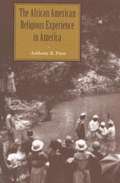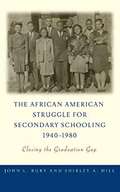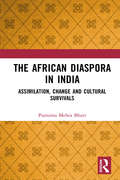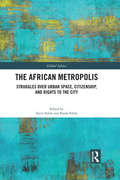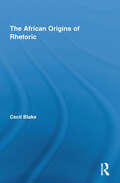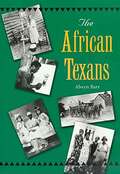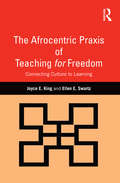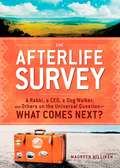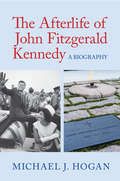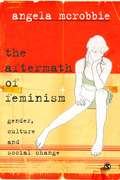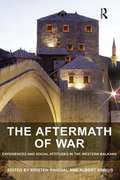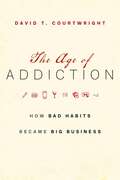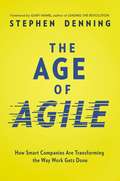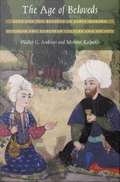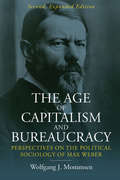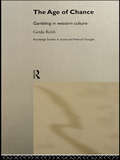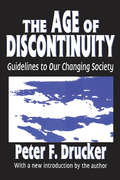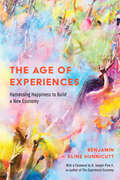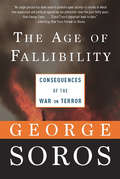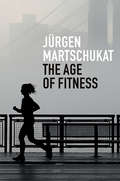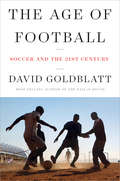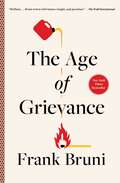- Table View
- List View
The African American Religious Experience in America (The American Religious Experience)
by Anthony Pinn<p>Most who think about African American religion limit themselves to black churches, or perhaps to aspects of Islamic thought and practice. But a close look at the religious landscape of African American communities presents a much more complex, thick, and layered religious reality comprising many competing faiths and practices. The African American Religious Experience in America provides readers with an introduction to the tremendous religious diversity of African American communities in the United States, with snapshots of 11 religious traditions practiced by African Americans―from Buddhism to Catholicism, from Judaism to Voodoo. Each snapshot provides readers a better understanding of how African Americans practice their faiths in the United States. <p>The African American Religious Experience in America provides resources for students taking classes on the history of American religion, African American Studies, and on American Studies. In addition to the in-depth discussion of the varieties of African American Religion, the volume includes a historical introduction to the development of African American Religion, a glossary of terms, a timeline of important events, a series of short biographies of important figures in the history of African American religion and a bibliography of sources for further study. Finally, the book includes a series of primary source documents that will provide students with first-person accounts of how religion is practiced in the African American community both today and in the past.</p>
The African American Struggle for Secondary Schooling, 1940-1980: Closing the Graduation Gap
by John L. Rury Shirley A. HillThis is the first comprehensive account of African American secondary education in the postwar era. Drawing on quantitative datasets, as well as oral history, this compelling narrative examines how African Americans narrowed the racial gap in high school completion. <p><p> The authors explore regional variations in high school attendance across the United States and how intraracial factors affected attendance within racial groups. They also examine the larger social historical context, such as the national high school revolution, the civil rights movement, campaigns to expand schooling and urging youth to stay in school, and Black migration northward. Closing chapters focus on desegregation and the "urban crisis" of the 1960s and 1970s that accelerated “White flight” and funding problems for urban school systems. <p><p> The conclusion summarizes these developments and briefly looks at the period since 1980, when secondary attainment levels stopped advancing for Blacks and Whites alike.
The African Diaspora in India: Assimilation, Change and Cultural Survivals
by Purnima Mehta BhattThis book explores the understudied and often overlooked subject of African presence in India. It focuses on the so-called Sidis, Siddis or Habshis who occupy a unique place in Indian history. The Sidis comprise scattered communities of people of African descent who travelled and settled along the western coast of India, mainly in Gujarat, but also in Goa, Karnataka, Andhra Pradesh, Sri Lanka and in Sindh (Pakistan) as a result of the Indian Ocean trade from the thirteenth to nineteenth centuries. The work draws from extant scholarly research and documentary sources to provide a comprehensive study of people of African descent in India and sheds new light on their experiences. By employing an interdisciplinary approach across fields of history, art, anthropology, religion, literature and oral history, it provides an analysis of their negotiations with cultural resistance, survivals and collective memory. The author examines how the Sidi communities strived to construct a distinct identity in a new homeland in a polyglot Indian society, their present status, as well as their future prospects. The book will interest those working in the fields of history, sociology and social anthropology, cultural studies, international relations, and migration and diaspora studies.
The African Metropolis: Struggles over Urban Space, Citizenship, and Rights to the City (Global Africa)
by Toyin Falola Bisola FalolaOn a planet where urbanization is rapidly expanding, nowhere is the growth more pronounced than in cities of the global South, and in particular, Africa. African metropolises are harbingers of the urban challenges that lie ahead as societies grapple with the fractured social, economic, and political relations forming within these new, often mega, cities. The African Metropolis integrates geographical and historical perspectives to examine how processes of segregation, marginalization, resilience, and resistance are shaping cities across Africa, spanning from Nigeria and Ghana to Kenya, Ethiopia, and South Africa. The chapters pay particular attention to the voices and daily realities of those most vulnerable to urban transformations, and to questions such as: Who governs? Who should the city serve? Who has a right to the city? And how can the built spaces and contentious legacies of colonialism and prior development regimes be inclusively reconstructed? In addition to highlighting critical contemporary debates, the book furthers our ability to examine the transformations taking place in cities of the global South, providing detailed accounts of local complexities while also generating insights that can scale up and across to similar cities around the world. This book will be of interest to students and scholars of African Studies, urban development and human geography.
The African Origins of Rhetoric (African Studies)
by Cecil BlakeThrough a critical analysis of ancient African texts that predate Greco-Roman treatises Cecil Blake revisits the roots of rhetorical theory and challenges what is often advanced as the "darkness metaphor" -- the rhetorical construction of Africa and Africans. Blake offers a thorough examination of Ptah-hotep and core African ethical principles (Maat) and engages rhetorical scholarship within the wider discourse of African development. In so doing, he establishes a direct relationship between rhetoric and development studies in non-western societies and highlights the prospect for applying such principles to ameliorating the development malaise of the continent.
The African Texans
by Alwyn BarrImmigrants of African descent have come to Texas in waves—first as free blacks seeking economic and social opportunity under the Spanish and Mexican governments, then as enslaved people who came with settlers from the deep South. Then after the Civil War, a new wave of immigration began. In The African Texans, author Alwyn Barr considers each era, giving readers a clear sense of the challenges that faced African Texans and the social and cultural contributions that they have made in the Lone Star State. With wonderful photographs and first-hand accounts, this book expands readers’ understanding of African American history in Texas. Special features include · 59 illustrations · 12 biographical sketches · excerpts from newspaper articles · excerpts from court rulings The African Texans is part of a five-volume set from the Institute of Texan Cultures. The entire set, entitled Texans All, explores the social and cultural contributions made by five distinctive cultural groups that already existed in Texas prior to its statehood or that came to Texas in the early twentieth century: The Indian Texans, The Mexican Texans, The European Texans, The African Texans, and The Asian Texans.
The Afrocentric Praxis of Teaching for Freedom: Connecting Culture to Learning
by Joyce E. King Ellen E. SwartzThe Afrocentric Praxis of Teaching for Freedom explains and illustrates how an African worldview, as a platform for culture-based teaching and learning, helps educators to retrieve African heritage and cultural knowledge which have been historically discounted and decoupled from teaching and learning. The book has three objectives: To exemplify how each of the emancipatory pedagogies it delineates and demonstrates is supported by African worldview concepts and parallel knowledge, general understandings, values, and claims that are produced by that worldview To make African Diasporan cultural connections visible in the curriculum through numerous examples of cultural continuities––seen in the actions of Diasporan groups and individuals––that consistently exhibit an African worldview or cultural framework To provide teachers with content drawn from Africa’s legacy to humanity as a model for locating all students––and the cultures and groups they represent––as subjects in the curriculum and pedagogy of schooling This book expands the Afrocentric praxis presented in the authors’ "Re-membering" History in Teacher and Student Learning by combining "re-membered" (democratized) historical content with emancipatory pedagogies that are connected to an African cultural platform.
The Afterlife Survey
by Maureen MillikenIt's only human to ask that inevitable question: What happens when we die? Are we reincarnated? Do we go to heaven? Is death the end of everything? Or do our souls pass on to another life? Do we even have souls?
The Afterlife Survey
by Maureen MillikenIs there life after death? It depends on who you ask...It happens to all of us, yet...what happens when we die? Are we reincarnated? Do we go to heaven? Is death the end of everything? Or do our souls pass on to another life? Do we even have souls? These are the questions humans have wrestled with since the dawn of mankind. We've heard answers from philosophers and theologians. Now, for the first time collected in a single volume, people from every faith and calling share their thoughts on this most fundamental problem. Ordinary folk from all walks of life offer their ideas about what happens after our life has run its course. Sooner or later everyone makes that final journey. Now readers can find inspiration from a wide range of enlightening opinions as they form their own thoughts about the afterlife.
The Afterlife Survey: A Rabbi, a CEO, a Dog Walker, and Others on the Universal Question—What Comes Next?
by Maureen MillikenIs there life after death? It depends on who you ask...It happens to all of us, yet...what happens when we die? Are we reincarnated? Do we go to heaven? Is death the end of everything? Or do our souls pass on to another life? Do we even have souls? These are the questions humans have wrestled with since the dawn of mankind. We've heard answers from philosophers and theologians. Now, for the first time collected in a single volume, people from every faith and calling share their thoughts on this most fundamental problem. Ordinary folk from all walks of life offer their ideas about what happens after our life has run its course. Sooner or later everyone makes that final journey. Now readers can find inspiration from a wide range of enlightening opinions as they form their own thoughts about the afterlife.
The Afterlife of John Fitzgerald Kennedy
by Michael J. HoganIn his new book, Michael J. Hogan, a leading historian of the American presidency, offers a new perspective on John Fitzgerald Kennedy, as seen not from his life and times but from his afterlife in American memory. The Afterlife of John Fitzgerald Kennedy considers how Kennedy constructed a popular image of himself, in effect, a brand, as he played the part of president on the White House stage. The cultural trauma brought on by his assassination further burnished that image and began the process of transporting Kennedy from history to memory. Hogan shows how Jacqueline Kennedy, as the chief guardian of her husband's memory, devoted herself to embedding the image of the slain president in the collective memory of the nation, evident in the many physical and literary monuments dedicated to his memory. Regardless of critics, most Americans continue to see Kennedy as his wife wanted him remembered: the charming war hero, the loving husband and father, and the peacemaker and progressive leader who inspired confidence and hope in the American people.
The Aftermath of Feminism: Gender, Culture and Social Change (Culture, Representation and Identity series)
by Angela McrobbieCongratulations to Dr. McRobbie! This book has been named to the list of books for the 2009 Critics Choice Book Award of the American Educational Studies Association (AESA). These essays show Angela McRobbie reflecting on a range of issues which have political consequence for women, particularly young women, in a context where it is frequently assumed that progress has been made in the last 30 years, and that with gender issues now 'mainstreamed' in cultural and social life, the moment of feminism per se is now passed. McRobbie trenchantly argues that it is precisely on these grounds that invidious forms of gender -re-stabilisation are able to be re-established. Consumer culture, she argues, encroaches on the terrain of so called female freedom, appears supportive of female success only to tie women into new post-feminist neurotic dependencies. These nine essays span a wide range of topics, including - the UK government's 'new sexual contract' to young women, - popular TV makeover programmes, - feminist theories of backlash and the 'undoing' of sexual politics, - feminism in a global frame - the 'illegible rage' underlying contemporary femininities.
The Aftermath of War: Experiences and Social Attitudes in the Western Balkans
by Albert SimkusAt a time when most observers saw war in Europe as belonging to an ever more distant past, the wars of Yugoslav succession shattered this illusion. The direct and indirect consequences of these wars for people in the region are still not fully understood, but it is clear that the war has had far reaching social and political consequences for each national society as a whole. This groundbreaking volume provides a series of analyses of experiences and social attitudes in the Western Balkans in the aftermath of those wars. Based on survey data from 22,000 respondents, the editors have created a volume which contributes to our understanding of both specific war-related effects as well as a detailed description of contemporary attitudes and values across these societies. This book will be of interest to academic specialists and students interested in the effects of war on psychological health and on ethnic relations in the Western Balkans as well as how this applies to other post-conflict societies. It will also be of interest to sociologists, political scientists, and historians studying differences in attitudes between the countries, ethnic groups, and generations in this region related to diverse topics from ethnic tolerance to states’ responsibility for equality and gender roles.
The Age of Addiction: How Bad Habits Became Big Business
by David T. CourtwrightWe live in an age of addiction, from compulsive gaming and shopping to binge eating and opioid abuse. What can we do to resist temptations that insidiously and deliberately rewire our brains? Nothing, David Courtwright says, unless we understand the global enterprises whose “limbic capitalism” creates and caters to our bad habits.
The Age of Agile: How Smart Companies Are Transforming the Way Work Gets Done
by Stephen DenningAn unstoppable business revolution is under way, and it is Agile. Sparking dramatic improvements in quality, innovation, and speed-to-market, the Agile movement has helped companies learn to connect everyone and everything…all the time.With rapidly evolving consumer needs and technology that is being updated quicker than ever before, businesses are recognizing how essential it is to adapt quickly. The Agile movement enables a team, unit, or enterprise to nimbly acclimate and upgrade products and services to meet these constantly changing needs.Filled with examples from every sector, The Age of Agile helps you:Master the three laws of Agile Management (team, customer, network)Embrace the new mindsetOvercome constraintsEmploy meaningful metricsMake the entire organization AgileCompanies don&’t need to be born Agile. With the groundbreaking formulas laid out in The Age of Agile, even global giants can learn to act entrepreneurially. Your company&’s future may depend on it!
The Age of Beloveds: Love and the Beloved in Early-Modern Ottoman and European Culture and Society
by Walter G. Andrews Mehmet KalpaklıThe Age of Beloveds offers a rich introduction to early modern Ottoman culture through a study of its beautiful lyric love poetry. At the same time, it suggests provocative cross-cultural parallels in the sociology and spirituality of love in Europe--from Istanbul to London--during the long sixteenth century. Walter G. Andrews and Mehmet Kalpakli provide a generous sampling of translations of Ottoman poems, many of which have never appeared in English, along with informative and inspired close readings. The authors explain that the flourishing of Ottoman power and culture during the "Turkish Renaissance" manifested itself, to some degree, as an "age of beloveds," in which young men became the focal points for the desire and attention of powerful officeholders and artists as well as the inspiration for a rich literature of love. The authors show that the "age of beloveds" was not just an Ottoman, eastern European, or Islamic phenomenon. It extended into western Europe as well, pervading the cultures of Venice, Florence, Rome, and London during the same period. Andrews and Kalpakli contend that in an age dominated by absolute rulers and troubled by war, cultural change, and religious upheaval, the attachments of dependent courtiers and the longings of anxious commoners aroused an intense interest in love and the beloved. The Age of Beloveds reveals new commonalities in the cultural history of two worlds long seen as radically different.
The Age of Capitalism and Bureaucracy: Perspectives on the Political Sociology of Max Weber
by Wolfgang J. MommsenThe historian Wolfgang Mommsen was one of the foremost experts on Max Weber as well as an insightful and accessible interpreter of his work. Mommsen’s classic book, first published in 1974 under the title The Age of Bureaucracy, not only concisely explains the basic concepts underlying Weber’s worldview, but also explores the historical, social, and intellectual contexts in which he operated, including Weber’s development as an academic, his relationship to German nationalism, and his engagement with Marxism. Supplemented with a new foreword, a bibliography that includes recent studies, and a postscript by Volker Berghahn that surveys the most important debates on Weber's work since his death, this short volume serves as an excellent resource for scholars and students alike.
The Age of Chance: Gambling in Western Culture (Routledge Studies in Social and Political Thought #Vol. 22)
by Gerda ReithThis fascinating and extensive study, enlivened by interviews with British and American gamblers, will be enthralling reading not just for those interested in the cultural and social implications of gambling - researchers in sociology, cultural studies and the history of ideas - but for anyone interested in how we create meaning in an increasingly insecure world.
The Age of Clean Label Foods
by Charis M. GalanakisIn recent years, "clean label" has become a trendy term in the food industry, spurring innovations in food product development. While the concept of "clean label" is relatively new, without any legal definition, it has a high market appearance and industrial relevance. Consumer demands are leading food and beverage manufacturers toward removing synthetic additives (e.g., emulsifiers) and incorporating natural ingredients. Indeed, many big food companies have committed to eliminating artificial food additives from their products altogether. However, the substitution of chemical preservatives for natural ingredients without compromising food safety, convenience, and sensory quality is a challenge for food technologists.The Age of Clean Label Foods offers a guide to this approach with a thorough exploration of "clean label" ingredients in foods and the development of these food products. All aspects of clean label foods are covered in this essential reference, including recent developments in "clean label ingredients," technologies for producing or enhancing the functionality of ingredients, the interaction of ingredients with emerging food processing technologies, legislative frameworks, and consumer attitudes. Particular emphasis is given to trendy topics in the clean label industry, such as products with reduced-fat or reduced salt content, modified starches, natural emulsifiers, antioxidants, flavorings and antimicrobials, and fermented foods, as well as active and intelligent packaging for clean label foods. Through this text, the authors hope to promote a better understanding from which food technologists and food microbiologists can operate in the "clean-label" arena, taking into consideration all the key aspects of food quality, sensory characteristics, and food safety.
The Age of Discontinuity: Guidelines to Our Changing Society
by Peter DruckerThe closing decades of the twentieth century have been characterized as a period of disruption and discontinuity in which the structure and meaning of economy, polity, and society have been radically altered. In this volume Peter Drucker focuses with great clarity and perception on the forces of change that are transforming the economic landscape and creating tomorrow's society.Drucker discerns four major areas of discontinuity underlying contemporary social and cultural reality. These are: (1) the explosion of new technologies resulting in major new industries; (2) the change from an international to a world economy—an economy that presently lacks policy, theory, and institutions; (3) a new sociopolitical reality of pluralistic institutions that poses drastic political, philosophical, and spritual challenges; and (4) the new universe of knowledge based on mass education and its implications in work, leisure, and leadership.Peter Drucker brings to this work an intimate knowledge and objective view of the particular and general. The Age of Discontinuity is a fascinating and important blueprint for shaping a future already very much with us.
The Age of Experiences: Harnessing Happiness to Build a New Economy
by Benjamin HunnicuttIn The Age of Experiences, Benjamin Kline Hunnicutt examines how the advance of happiness science is impacting the economy, making possible new experience-products that really make people happy and help forward-looking businesses expand and develop new technologies. In today’s marketplace there is less interest in goods and services and more interest in buying and selling personal improvements and experiences. Hunnicutt traces how this historical shift in consumption to the “softer” technologies of happiness represents not only a change in the modern understanding of progress, but also a practical, economic transformation, profoundly shaping our work and the ordering of our life goals. Based on incisive historical research, Hunnicutt demonstrates that we have begun to turn from material wealth to focus on the enrichment of our personal and social lives. The Age of Experiences shows how industry, technology, and the general public are just beginning to realize the potential of the new economy. Exploring the broader implications of this historical shift, Hunnicutt concludes that the new demand for experiences will result in the reduction of work time, the growth of jobs, and the regeneration of virtue—altogether an increasingly healthy public life.
The Age of Fallibility: Consequences of the War on Terror
by George SorosThe legendary financier ? and founder of the Open Society Institute ? offers crucial insight into the real meaning of freedom, and how societies can best promote it.
The Age of Fitness: How the Body Came to Symbolize Success and Achievement
by Jürgen MartschukatWe live in the age of fitness. Hundreds of thousands of people run marathons and millions go jogging in local parks, work out in gyms, cycle, swim, or practice yoga. The vast majority are not engaged in competitive sport and are not trying to win any medals. They just want to get fit. Why this modern preoccupation with fitness? In this new book, Jürgen Martschukat traces the roots of our modern preoccupation with fitness back to the birth of modern societies in the eighteenth century, showing how the idea of fitness was interwoven with modernity’s emphasis on perpetual optimization and renewal. But it is only in the period since the 1970s, he argues, that the age of fitness truly emerged, as part and parcel of our contemporary neoliberal era. Neoliberalism enjoins individuals to work on themselves, to cultivate themselves in body and mind. Fitness becomes a guiding principle of social life, an era-defining network of discourses and practices that shape individuals’ actions and self-conceptions. The pursuit of fitness becomes a cultural repertoire that is deeply ingrained in our institutions and way of life. This wide-ranging book shows how deeply fitness is inscribed in modern societies, and how important fitness has become to success or failure, recognition or exclusion, in a society that sets great store by self-responsibility, performance, market, and competition. It will be of great value not only to those interested in sport and fitness, but also to anyone concerned with the conditions of success and failure in our societies today.
The Age of Football: Soccer And The 21st Century
by David GoldblattA monumental exploration of soccer and society in our time—by its preeminent historian. In the twenty-first century, soccer commands the allegiance, interest, and engagement of more people in more places than any other phenomenon in the world. David Goldblatt—author of the acclaimed, best-selling The Ball Is Round—charts the sport’s global cultural ascent, economic transformation, and deep politicization. Based on a decade of research and reporting, The Age of Football sheds light on the greatest issues of our time—including globalization, immigration, nationalism—and the role that soccer plays. From soccer’s connections to social discord in the Middle East as a site for protest and a tool for dictatorships to the reasons behind its surprising surge in popularity in China, India, and the United States, Goldblatt reveals that this massively popular sport is vital to understanding our social, political, and economic lives. Tracking the rise of interest in women’s teams throughout the world and the controversy imbedded in the domestic football associations emerging across nations in Africa, he explores the use (and misuse) of soccer in the global advancement of equality and human rights. With breathtaking scope and unparalleled knowledge of the game, The Age of Football proves that whether you call it football or soccer, you can’t make sense of the modern world without understanding its most popular sport
The Age of Grievance
by Frank BruniNEW YORK TIMES BESTSELLER • &“Brilliant...Bruni writes with humor, insight, and precision.&” —Wall Street Journal • &“The best prescription for our redemption.&” —The New York Times • &“A wise and humane book for our foolish and cruel era.&” —Jonathan Haidt, author of The Anxious Generation From bestselling author and longtime New York Times columnist Frank Bruni comes a lucid, powerful examination of the ways in which grievance has come to define our current culture and politics, on both the right and left.The twists and turns of American politics are unpredictable, but the tone is a troubling given. It&’s one of grievance. More and more Americans are convinced that they&’re losing because somebody else is winning. More and more tally their slights, measure their misfortune, and assign particular people responsibility for it. The blame game has become the country&’s most popular sport and victimhood its most fashionable garb. Grievance needn&’t be bad. It has done enormous good. The United States is a nation born of grievance, and across the nearly two hundred and fifty years of our existence as a country, grievance has been the engine of morally urgent change. But what happens when all sorts of grievances—the greater ones, the lesser ones, the authentic, the invented—are jumbled together? When people take their grievances to lengths that they didn&’t before? A violent mob storms the US Capitol, rejecting the results of a presidential election. Conspiracy theories flourish. Fox News knowingly peddles lies in the service of profit. College students chase away speakers, and college administrators dismiss instructors for dissenting from progressive orthodoxy. Benign words are branded hurtful; benign gestures are deemed hostile. And there&’s a potentially devastating erosion of the civility, common ground, and compromise necessary for our democracy to survive. How did we get here? What does it say about us, and where does it leave us? The Age of Grievance examines these critical questions and charts a path forward.
